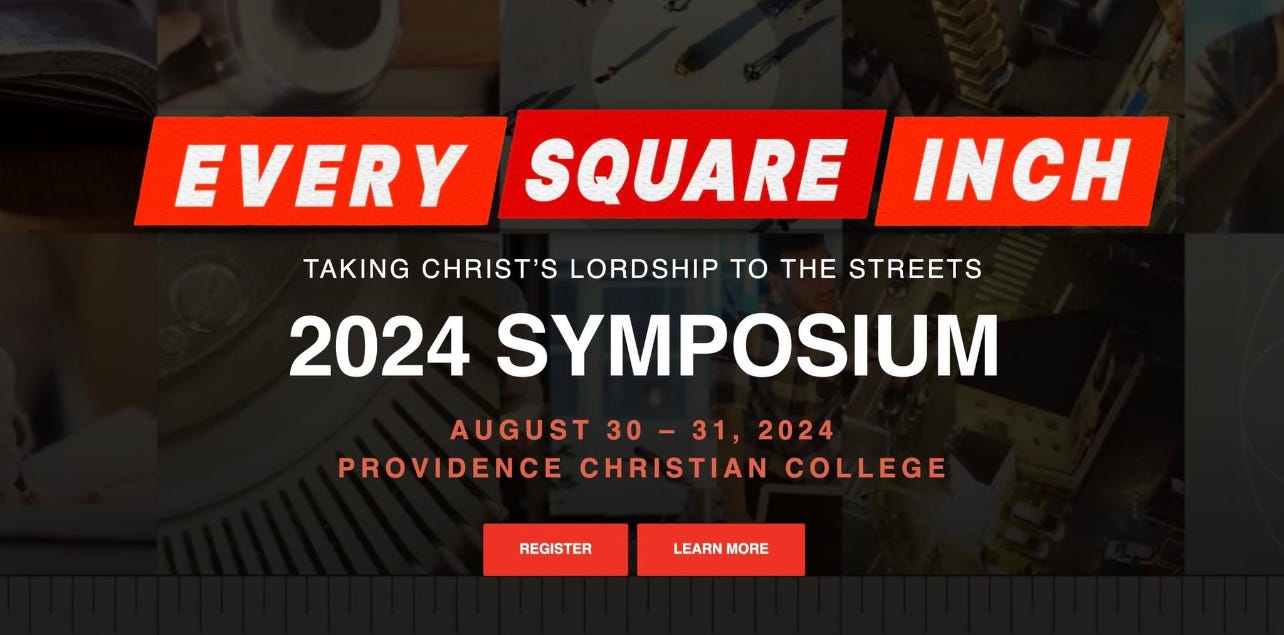Double-Decker Christians
If it sounds strange to speak of a biblical politics, education, entertainment, architecture, or science, it sounds stranger still to speak of a place in God’s creation where his word doesn't govern.
Dear friends and supporters:
For centuries the church has been afflicted by dualistic thinking — two fundamentally different modes of being or reality. A useful metaphor for grasping this thinking is the popular red double-decker tour buses in London. (To my knowledge, Francis A. Schaeffer was the first to employ a spatial metaphor for this dualism: the upper story versus the lower story.) The Bible and church and theology and prayer and the Christian life are on the upper deck, and the rest of life — vocation, education, finances, arts, entertainment, sports, etc. — is on the lower deck. What happens on one deck has no relevance to what happens on the other. The Bible and the Faith have no bearing on “public” life outside the church and Christian family and at most the Christian school. And life on the lower deck of the wider culture couldn’t care less about the Christianity on the upper deck as long as Christianity stays courteously up there and doesn’t come downstairs to encroach on “the real world.”
Double-Decker Theology
There is a theology behind this thinking. The medieval church, partly under the influence of the brilliant Christian thinker Thomas Aquinas, developed a “nature-grace distinction.” All of life could be compartmentalized as either nature or grace. Aquinas was greatly influenced by the ancient pagan Greek philosopher Aristotle, who tried to give a philosophical explanation for all of life.
The secular governs the culture, and the sacred governs the church. Over time the church finds it difficult to hold out against such a pervasive enemy. In the end, the church itself becomes secularized.
As a Christian, Aquinas couldn’t follow Aristotle in this comprehensive pagan philosophy, of course, so he created a compound consisting of (1) Aristotle’s philosophy (nature), and (2) Christianity (grace). Aquinas was a Western Catholic, so he had an exceedingly high ecclesiology (doctrine of the church). When he considered Christianity, he thought of it as a comprehensively churchly Faith. So Christianity was “grace,” all that happened inside the church (sacraments, etc.), while non-Christianity was “nature,” everything outside the church. This didn’t mean the outside culture should be boldly anti-Christian. It did mean the wider society shouldn’t be governed by Jesus and the Bible, but rather by “common-sense” assumptions on which anybody, Christian and non-Christian alike, could agree. In practice, this meant you were truly Christian within the church, but part of an ethically common humanity outside the church. It also meant the standards inside the church did not apply outside the church. This led to double-decker living.
Two Levels of Society
Starting in the 17th century this nature-grace distinction yielded to the secular-sacred distinction, which radically altered society and led straight to the depraved culture surrounding us today. How? When the Enlightenment came along, it said man’s reason and not God’s revelation is life’s standard. This meant the “grace” side of the nature-grace distinction receded in importance and the “secular” side of the secular-sacred distinction began to control all of life (see my “There Is No Secular-Sacred Distinction”). It took generations for the apostasy to ferment, but today the Bible and the Faith aren’t permitted as barriers to social depravity like abortion-on-demand, pornography, gay “marriage,” “gender-affirmation surgery,” no-fault divorce, ideological feminism, and much else.
This sounds like the medieval nature-grace distinction, but there’s an important difference. In the medieval world, all that is outside the church (nature) is expected to come to the church for baptism, both literally and figuratively. Nature couldn’t be Christian or sacred (governed by Christ and the Bible) on its own terms, but only as it got from time to time under the umbrella of the church, participating in the elaborate hierarchy and sacramental system. So nature wasn’t considered so much anti-Christian as non-Christian. Christianity is the church.
Our World’s Secular-Sacred Distinction
But with the more recent secular-sacred distinction, there is no interest whatsoever in the wider society’s baptism by the church. Rather, the goal is to keep the sacred inside the church, and assure that everything outside the church is radically secular. This means there’s no divine revelation, no divine check on man’s dreams of utopian cultural rebellion. The secular governs the culture, and the sacred governs the church. Over time the church finds it difficult to hold out against such a pervasive enemy. In the end, the church itself becomes secularized.
Two Kinds of Living
But the secular-sacred distinction doesn’t pervade only the culture and the church. And also invades our own lives. We become double-decker Christians. We want to submit to Jesus in the church, but out in the “real world,” what that commitment looks like is often quite vague. For instance, if we own a small business, we might simply default to acceptable business standards, worldly though they might be. We won’t ask what the Bible has to say about economics and business — employer-employee relations, business taxation, minimum wage law, and much more. We’re not explicitly Christian when running our business, since the only Christianity that really matters is in the church. If we’re university students, we don’t judge all we hear by God’s word. In science, we might try to synthesize the biblical creation account with Darwinism and come up with “theistic evolution” or “evolutionary creation.” In history class we buy the professor’s thesis that the West gained dominance by sexism, racism, and imperialism. In the social sciences, we might surrender to the prominent Marxist idea that altering language alters reality — “gender” is a “social construction,” for example. Instances abound.
When we don’t allow God’s word to govern all of our thinking and acting, we become double-decker Christians. We are card-caring members of the secular-sacred distinction.
Conclusion
In dramatic contrast, there are no areas of life prohibited to the Bible’s authority. When we encounter any situation, our first thought should be: What does God’s word say? There is simply no room for a Christianity that makes no room for the Bible in some area of life. If it sounds strange to speak of a biblical politics or education or music or entertainment or architecture or technology, it sounds stranger still to speak of a place in God’s creation where his word isn’t permitted to govern.
Personal
About a month ago, I contracted shingles (I’m now officially old). We promptly began praying it would be a comparatively mild case and acquired antivirals quickly. Well, the Lord answered prayer and the shingles were not too bad. Of course, “not too bad” doesn’t mean “not painful.” They’ve all cleared up by now. And I couldn’t have navigated this difficulty without my very own private duty RN, otherwise known as my loving wife Sharon.
I just put the finishing touches on my four lectures for the Worldview Youth Academy in Gatlinburg for Joe Boot and the Ezra Institute. If memory serves, the last time I was Gatlinburg was over 55 years ago when my father took me there as a boy. I’m sure it has changed dramatically since then. I’m looking forward to seeing some of you there. And please plan to sign up for the truthXchange conference the last weekend of August. See the details below.
Next time, I’ll probably post a podcast on “Christian Patriotism and Christian Internationalism.”
Thank you so much for your friendship and support. They keep CCL going. ✞
Yours for the cosmic Lord,
Founder & President, Center for Cultural Leadership
Isa. 49:1–2
Worldview Youth Academy in Tennessee
Friends, I hope you’ll join me this summer in Tennessee for this worldview event. Also, please consider sponsoring high school students for this transformational time.
Explore here.
Every Square Inch Symposium
I hope to see many of you at this exciting and informative event hosted by our friends at truthXchange:
Register here.
More great stuff
The Center for Cultural Leadership site is here.
My Amazon author page (print and digital) is here.
My I-Tunes sermons, lectures and podcasts are here.
You can find my sermons and lectures at my YouTube channel.
Sign up to get my blog updates here.
Here’s my Twitter feed.
If you want to get the free exclusive hard copy publication Christian Culture, please send me a Facebook private message.
The CCL phone number is 831-420-7230.
The mailing address is:
Center for Cultural Leadership
P. O. Box 100
Coulterville, CA 95311








